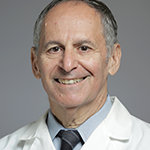“Then at some point, depending on how the patient is responding, I bring up the weight,” says Dr. Ogdie. “If they are interested in hearing more, I might talk about how healthy diets, such as cutting out simple carbs, can help psoriatic arthritis. I might bring up the patient’s BMI and make it clinical, saying that we know that patients with a BMI of over 30 don’t respond as well to therapy and that if you reduce body weight by 5% to 10%, you’ll likely significantly improve your response to therapy.”
If obesity affects your patient, you need to look around & see what resources you can use to build a team to address it.
—M. Elaine Husni, MD, MPH
How far this conversation goes, however, is up to the patient. “The last thing you want is to overwhelm your patients on the first visit, when they are dealing with a diagnosis of a chronic illness,” stresses Dr. Husni. “Obviously, they’re there to hear about the illness itself and treatments for psoriatic arthritis. So instead of listing all the advice right off the bat, I like to choose which associated issue to discuss at a particular visit. If it is time to talk about weight management, I ask for permission to talk about their weight. Some patients say, ‘Yeah, bring it on, what do you know about obesity, what can I do?’ and others say, ‘You know, I’ve heard it all. I’m really trying, and I don’t want to talk about it right now.’ In that case, I’ll say, ‘Oh, that’s okay, we don’t have to address this at this visit.’
“If you simply list all the things someone needs to do while getting their arthritis treated with anti-TNF therapy—such as lose weight, exercise three times a week, raise their heart rate 20 minutes a day and eat a well-balanced diet—they’re just not going to do it.”
Physical activity can be harder for obese people, and those who also have PsA are especially wary about exercise because they fear it might hurt their joints and/or worsen their symptoms—unfounded yet common fears, according to Dr. Ogdie. These patients may need extra reassurance and guidance from their medical team to feel safe about exercising. It can also be helpful to remind patients that additional weight gain is more likely when they are not physically active.
Treatment Strategies
The standard treatment approach for all patients with PsA may not be as effective in a patient with a BMI above 30. Although studies show the obese body may not respond as well to medications typically used to address inflammation as non-obese bodies do, the reasons for this are still being explored.



